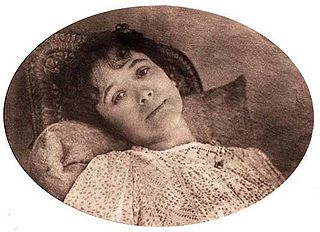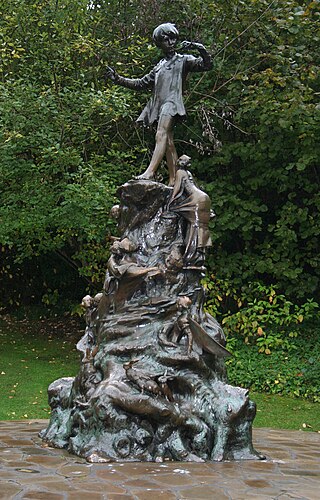
Sir James Matthew Barrie, 1st Baronet, was a Scottish novelist and playwright, best remembered as the creator of Peter Pan. He was born and educated in Scotland and then moved to London, where he wrote several successful novels and plays. There he met the Llewelyn Davies boys, who inspired him to write about a baby boy who has magical adventures in Kensington Gardens, then to write Peter Pan, or The Boy Who Wouldn't Grow Up, a 1904 West End "fairy play" about an ageless boy and an ordinary girl named Wendy who have adventures in the fantasy setting of Neverland.

Sir Ian Holm Cuthbert was an English actor known for his roles on stage and screen. Beginning his career on the British stage as a standout member of the Royal Shakespeare Company, he later transitioned into a successful and prolific screen career. He received numerous accolades including two BAFTA Awards and a Tony Award along with nominations for an Academy Award and two Emmy Awards. He was made a Commander of the Order of the British Empire (CBE) in 1989 by Queen Elizabeth II.

Finding Neverland is a 2004 biographical fantasy film directed by Marc Forster and written by David Magee, based on the 1998 play The Man Who Was Peter Pan by Allan Knee. The film is about playwright J. M. Barrie and his relationship with a family who inspired him to create Peter Pan. The film earned seven nominations at the 77th Academy Awards, including Best Picture, Best Adapted Screenplay, and Best Actor for Johnny Depp, and won for Best Original Score. The film was the inspiration for the stage musical of the same name in 2012.

Michael Llewelyn Davies was – along with his four brothers – the inspiration for J. M. Barrie's characters Peter Pan, the Darling brothers, and the Lost Boys. Late in life, his only surviving brother Nico described him as "the cleverest of us, the most original, the potential genius." He died in ambiguous circumstances, drowning with a close friend – and possible lover – just short of his 21st birthday. He was a first cousin of English writer Daphne du Maurier.

Peter Llewelyn Davies MC was the middle of five sons of Arthur and Sylvia Llewelyn Davies, one of the Llewelyn Davies boys befriended and later informally adopted by J. M. Barrie. Barrie publicly identified him as the source of the name for the title character in his 1904 play Peter Pan, or The Boy Who Wouldn't Grow Up. This public identification as "the original Peter Pan" plagued Davies throughout his life, which ended in suicide.

George Llewelyn Davies was the eldest son of Arthur and Sylvia Llewelyn Davies. Along with his four younger brothers, George was the inspiration for playwright J. M. Barrie's characters of Peter Pan and the Lost Boys. The character of Mr. George Darling was named after him. He was killed in action in the First World War. He was the first cousin of the English writer Daphne du Maurier.

Sylvia Llewelyn Davies was the mother of the boys who were the inspiration for the stories of Peter Pan by J. M. Barrie. She was the daughter of cartoonist and writer George du Maurier and his wife Emma Wightwick, the elder sister to actor Gerald du Maurier, the aunt of novelists Angela and Daphne du Maurier, and a great-granddaughter of Mary Anne Clarke, royal mistress of Prince Frederick, Duke of York and Albany.

John Llewelyn Davies was the second eldest of the Llewelyn Davies boys befriended by Peter Pan creator J. M. Barrie, and one of the inspirations for the boy characters in the story of Peter Pan. He served in the Royal Navy during World War I. He was the first cousin of the English writer Daphne du Maurier.

Nicholas "Nico" Llewelyn Davies was the youngest of the Llewelyn Davies boys, who were the inspiration for J. M. Barrie's Peter Pan and the Lost Boys. He was only a year old when Peter Pan, or The Boy Who Wouldn't Grow Up hit the stage in 1904, and as such was not a primary inspiration for the characters of Peter and the Lost Boys. However he was eight years old when the novel adaptation Peter and Wendy was published, and in later editions of the play, the character Michael Darling's middle name was changed to "Nicholas". He was the first cousin of the English writer Daphne du Maurier.
Llewelyn Davies is the formal surname of the family whose boys inspired J. M. Barrie to create the characters of Peter Pan and the Lost Boys:
The Davies boys were the inspiration for the stories of Peter Pan by J. M. Barrie, in which several of the characters were named after them. They were the sons of Sylvia (1866–1910) and Arthur Llewelyn Davies (1863–1907). Their mother was a daughter of French-born cartoonist and writer George du Maurier and sister of actor Gerald du Maurier, whose daughter was author Daphne du Maurier. Their father was a son of preacher John Llewelyn Davies, and brother of suffragist Margaret Llewelyn Davies.

Arthur Llewelyn Davies was an English barrister of Welsh origin, but is best known as the father of the boys who were the inspiration for the stories of Peter Pan by J. M. Barrie.
Andrew Timothy Birkin is an English screenwriter and director. He was born the only son of Lieutenant-Commander David Birkin and his wife, actress Judy Campbell. One of his sisters is the actress and singer Jane Birkin.
The Little White Bird is a novel by the Scottish writer J. M. Barrie, ranging in tone from fantasy and whimsy to social comedy with dark, aggressive undertones. It was published in November 1902, by Hodder & Stoughton in the UK and Scribner's in the US. The book attained prominence and longevity thanks to several chapters written in a softer tone than the rest of the book, which introduced the character and mythology of Peter Pan. In 1906, those chapters were published separately as a children's book, Peter Pan in Kensington Gardens.

Peter Pan; or, the Boy Who Wouldn't Grow Up, often known simply as Peter Pan, is a work by J. M. Barrie, in the form of a 1904 play and a 1911 novel titled Peter and Wendy, often extended in Peter Pan and Wendy. Both versions tell the story of Peter Pan, a mischievous little boy who can fly, and has many adventures on the island of Neverland that is inhabited by mermaids, fairies, "Indians" (American-Indians), and pirates. The Peter Pan stories also involve the characters Wendy Darling and her two brothers John and Michael, Peter's fairy Tinker Bell, the Lost Boys, and the pirate Captain Hook. The play and novel were inspired by Barrie's friendship with the Llewelyn Davies family. Barrie continued to revise the play for years after its debut until publication of the play script in 1928.

Egerton House was a small Elizabethan mansion which stood on the High Street in the town of Berkhamsted, Hertfordshire in England. Built during the reign of Queen Elizabeth I, it was demolished in 1937 and the site is now occupied by the Art Deco Rex Cinema. As well as its architectural merit, Egerton House was noted for its occupancy by the Llewelyn Davies family and its literary association with J. M. Barrie, author of Peter Pan.

Guy Louis Busson du Maurier DSO was an English army officer and playwright. He was the son of the writer George du Maurier and brother of Sylvia Llewelyn Davies and the actor Gerald du Maurier.

The statue of Peter Pan is a 1912 bronze sculpture of J. M. Barrie's character Peter Pan. It was commissioned by Barrie and made by Sir George Frampton. The original statue is displayed in Kensington Gardens in London, to the west of The Long Water, close to Barrie's former home on Bayswater Road. Barrie's stories were inspired in part by the gardens: the statue is at the place where Peter Pan lands in Barrie's 1902 book The Little White Bird after flying out of his nursery. Six other casts made by Frampton have been erected in other places around the world.

Mary Ansell was an English actress and author. She was born on 1 March 1861 in Paddington (London), the third child of George and Mary Ansell, who ran and lived over the King’s Head pub in Paddington. Ansell’s father died in 1875 and the family moved to Hastings, in Sussex.















